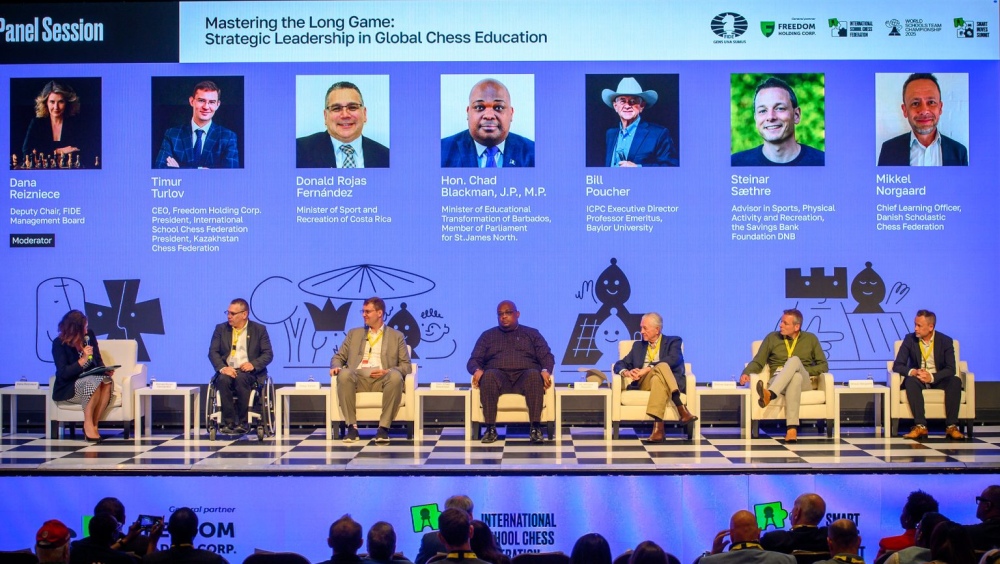
The Smart Moves Summit – a first of its kind global education conference focusing on the transformative power of chess in education – opened in Washington D.C.
The prestigious Episcopal High School in Alexandria will, for two days, play host to government officials, scientists, researchers, EdTech entrepreneurs, innovators, and chess experts. The international conference aims to build a global framework for cognitive development through chess and promote the game’s role in education.
The Smart Moves Summit is organised by FIDE and the International School Chess Federation (ISCF), with sponsorship from Freedom Holding.
Congressman Jamie Raskin, of Maryland’s 8th congressional district, opened the event. Raskin, a prominent fan of the game and a staunch supporter of chess in education, noted that the U.S. Chess Center, a significant and historically noteworthy non-profit located in his district, has taught chess to over 40,000 students.
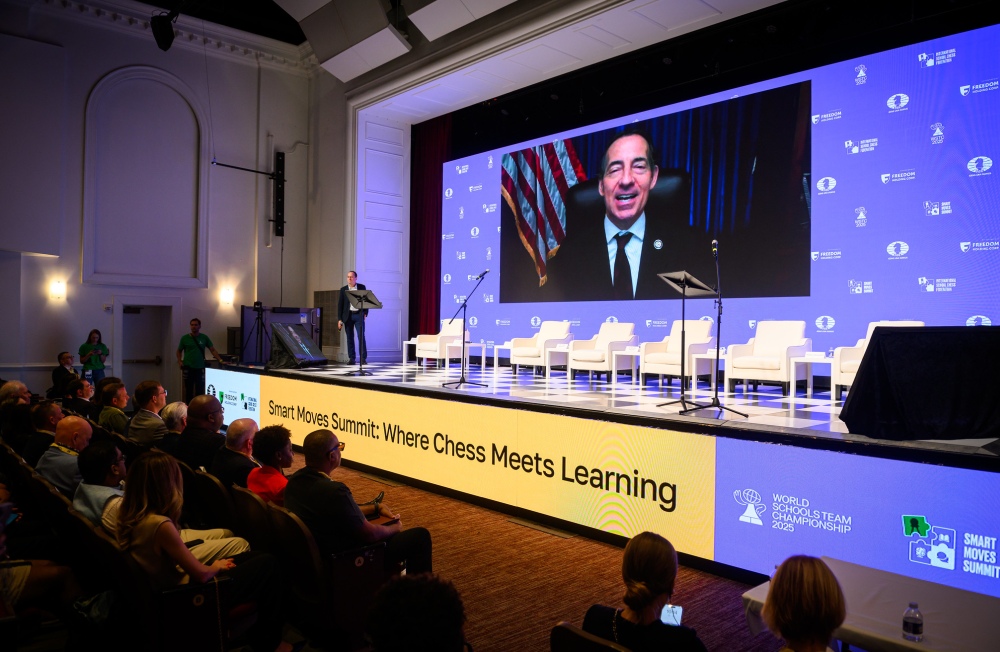
Chess as a mechanism for non-violent conflict resolution
Congressman Raskin noted the importance of chess “as a mechanism for non-violent conflict resolution and strategical critical thinking”.
He argued that chess is crucial to solving modern societal problems, as it promotes critical thinking over propaganda, strategic planning over impetuous behaviour, and non-violent, diplomatic resolution over violence.
“Chess can be a major part of the solution to the problems that beset Humanity right now. It seems like we’ve got a bunch of choices to make, what is? Are we going to try to promote critical thinking skills among young people, or are we going to promote Dogma and propaganda in fake news and conspiracy theory,” Raskin said.
He noted that, while chess promotes healthy competition, this competition is ultimately with oneself to achieve higher levels of thinking, and must be linked with a sense of community.
Congressman Raskin thanked FIDE President Arkady Dvorkovich and Freedom Holding CEO Timur Turlov for organising the Smart Move Summit, stating that their work is essential “to get us through the current crisis in world affairs in politics and in government”.
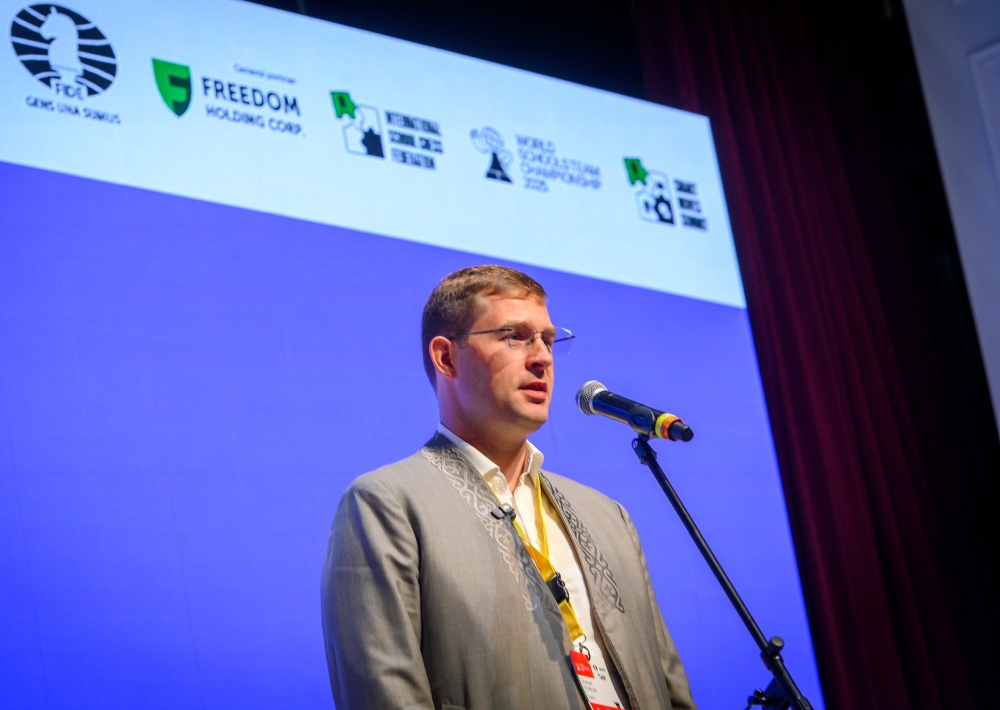
Fighting for focus in a fast-moving world
Timur Turlov, President of the ISCF and CEO of Freedom Holding, spoke about the challenges of living in a fast-moving world and the importance of adapting educational systems.
He highlighted the “ability to keep concentration” as the most valuable asset in an attention economy, and proposed that chess is an excellent tool to train this skill.
Turlov gave details of an initiative to implement chess in over 500 schools in Kazakhstan, with plans for more, and mentioned that scientific studies are underway to measure the results.
“We believe that the most valuable thing in our life now is our ability to keep concentration… and I really believe that chess could be a very great tool to overcome this challenge. Because chess is a very interesting game, it’s a game that can keep your attention for a long period of time and is a beautiful way to train your ability to concentrate,” Turlov said.
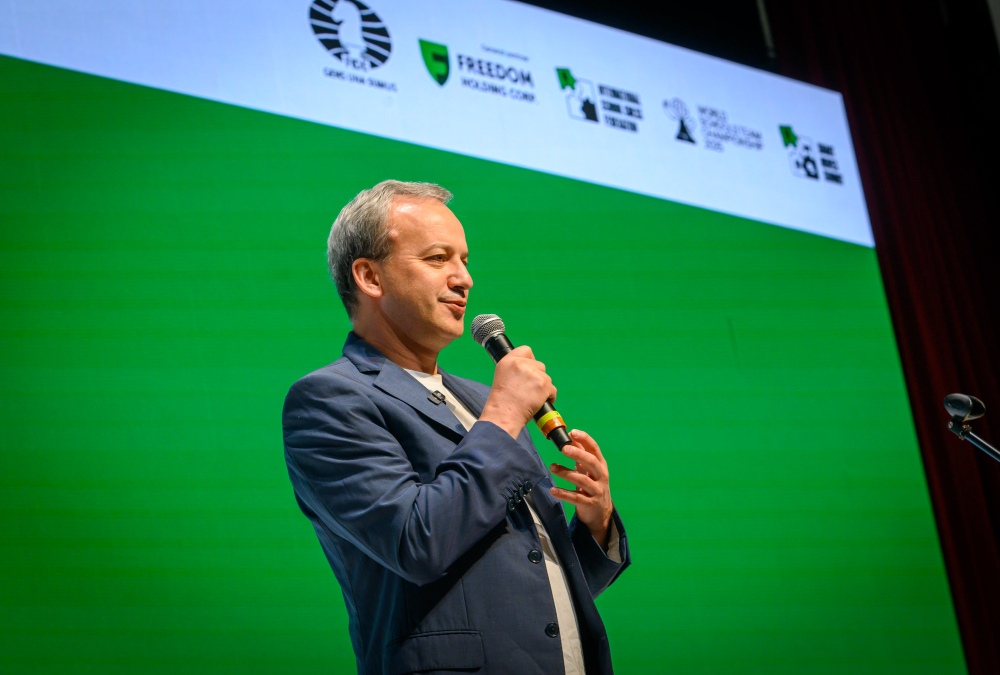
Arkady Dvorkovich on the importance of school chess championships for children
In his address, FIDE President Arkady Dvorkovich highlighted the importance of evolving educational systems to keep pace with rapid technological change. He argued that despite technological advancements, personal interaction remains key to the exchange of ideas and improvement.
Advocating the vital role chess has in education, Dvorkovich pointed out that events such as school championships, which put children in different settings to their everyday lives, are an important point of communication breeding progress.
“The whole idea of the World Schools Team Championship also came from that Soviet tradition,” Dvorkovich said. “My father was involved in that. By introducing chess into the educational system, we put students in these situations that are unknown in the classroom since they have to face a different world… they have to face some moves that matter, some smart moves, and they start thinking about how those pieces interact and how to think about the whole chessboard, and the surrounding, not just about one square.”
Real examples: How chess is changing education and improving societies
The first day of the Smart Moves Summit featured five panel discussions and a workshop. The topics included the role of chess in early and primary education, a global case study analysis on using chess to advance gender and socio-economic equality, and the opportunities of digital and educational platforms to harness the game’s power. Other sessions focused on aligning chess-based learning methodologies with public education goals, and a chess and math workshop.
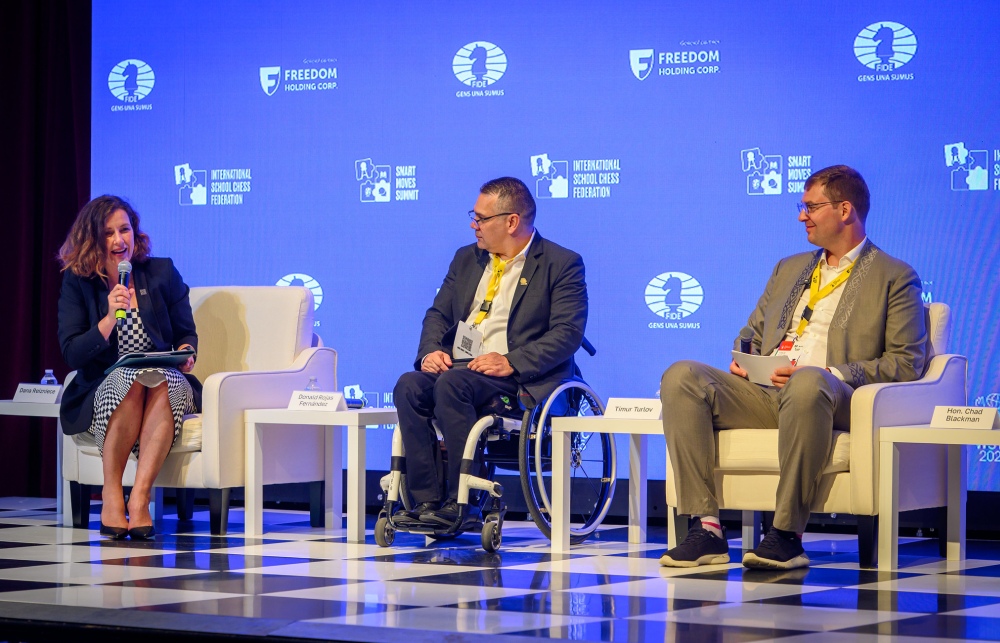
The central event of the day was a panel titled “Strategic Leadership in Global Chess Education,” which discussed long-term strategies, cross-sector collaboration, and how to drive initiatives to include chess as a part of official government policies.
Moderated by Dana Reizniece, Deputy Chair of the FIDE Management Board and the former Latvian Minister of Finance, the session featured government officials and program heads of organisations focusing on chess in education.
Timur Turlov, CEO of Freedom Holding, set the stage by describing chess education as a “long-term investment” in the mindset of an entire generation rather than “charity”, as its often seen.
“Strategy, self-control, attention management, the ability to think as part of a team—these are skills no modern leader can do without,” Turlov said. “And if we want these questions to develop internationally, we must integrate chess into the education system as a core subject.”
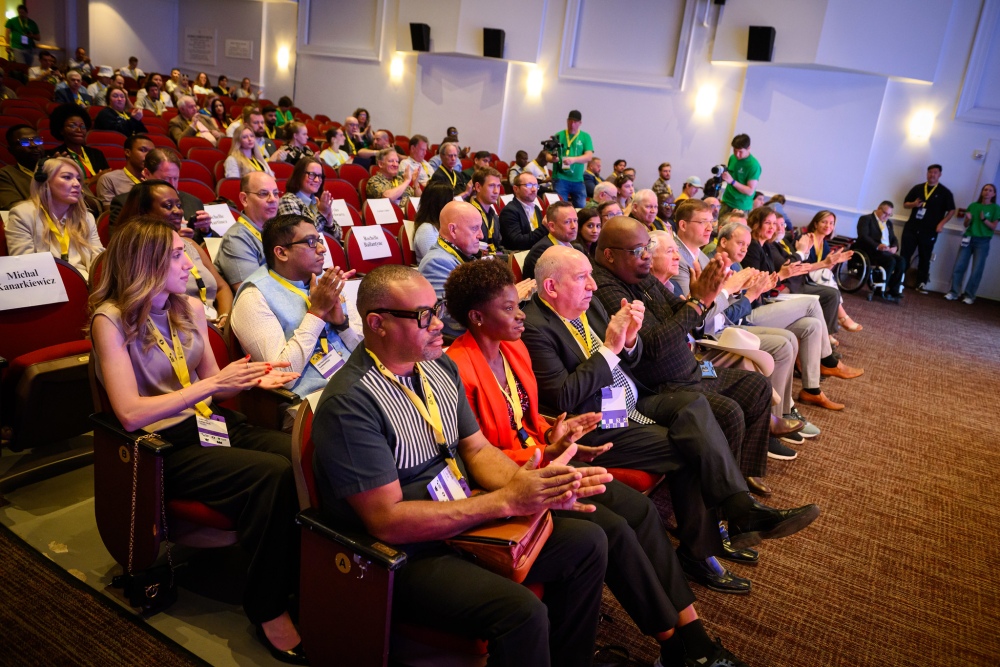
Turlov concluded by outlining his goal to build a global exchange platform for best practices in work and life principles, built through chess.
The discussion quickly shifted to the political and practical implementation of chess. Costa Rican Minister of Sport and Recreation Donald Rojas Fernández shared compelling data from pilot programs, revealing a decrease in bullying and an average eight percent increase in math and science grades among students who learned chess.
“The numbers don’t lie,” Fernandez stated, underscoring that the positive academic and social outcomes of implementing chess in education. This also helped influence the decision of the government of Costa Rica to make chess a national priority.
Echoing this sentiment, Minister Chad Blackman of Barbados announced a bold vision to transform his country’s education system by placing chess at its core.
In his speech, Blackman declared the goal is to make Barbados a world leader in education within seven years. He plans to use chess as a key tool to cultivate “globally competitive, confident, and resilient thinkers,” emphasizing a move to make the game a fundamental part of the curriculum from the early childhood level, rather than just an extracurricular activity.
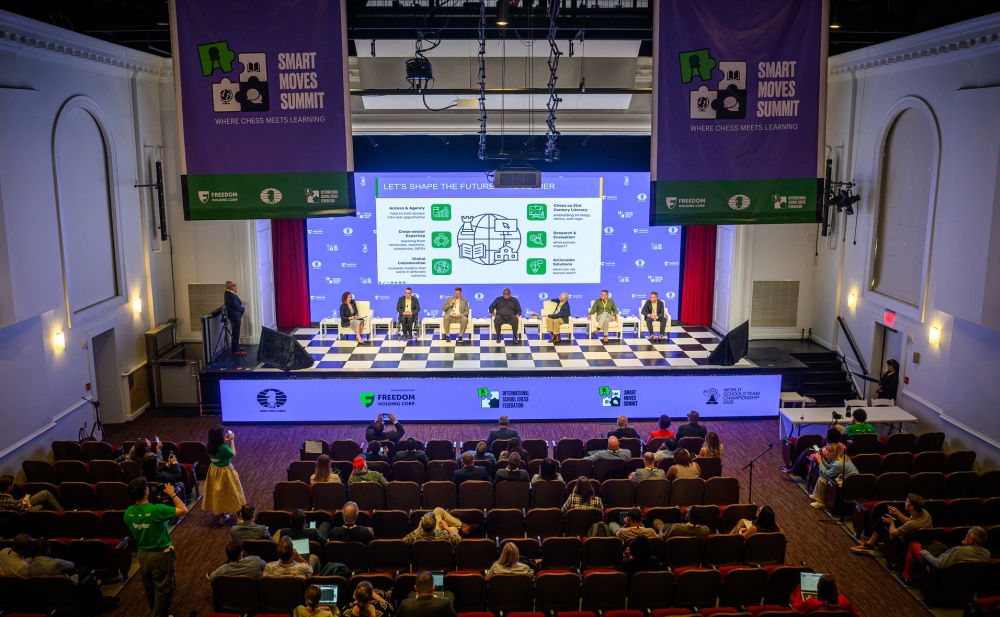
Academic experts also provided insights on the value of chess. Dr. William Poucher, Executive Director of the International Collegiate Programming Contest – whose members work at leading tech companies such as OpenAI, Google, and Meta – drew a direct line from chess to the team-based problem-solving skills needed in modern technology and innovation.
Poucher highlighted that the competitive but collaborative nature of chess prepares students to work in teams and build on each other’s strengths, an approach also implemented by AI.
Finally, the panel addressed the practical challenge of integrating chess into schools. Steinar Sæthre, from the Savings Bank Foundation DNB in Norway, noted that schools are increasingly requesting activities like chess to combat a decline in student attention spans. He also shared data showing that 25% of the entire Norwegian population has a chess account on Chess.com, one of the leading global online chess platforms.
Michael Norgaard, the Chief Learning Officer at the Danish Scholastic Chess Federation, argued that chess’s value, not just its low cost, should be the focus in getting governments to integrate it in education. His organisation develops practical, user-friendly tools that empower teachers with minimal chess knowledge to effectively teach chess, thereby ensuring its sustainability and widespread adoption.
The session concluded with a unified call for collaborative action among governments, corporations, and educational institutions to make chess a fundamental part of global education, preparing students for a future that demands strategic, resilient, and collaborative thinking.
The panel was followed by the signing of a Memorandum of Understanding between ISCF, FIDE and the government of Costa Rica for providing more support for chess in education.
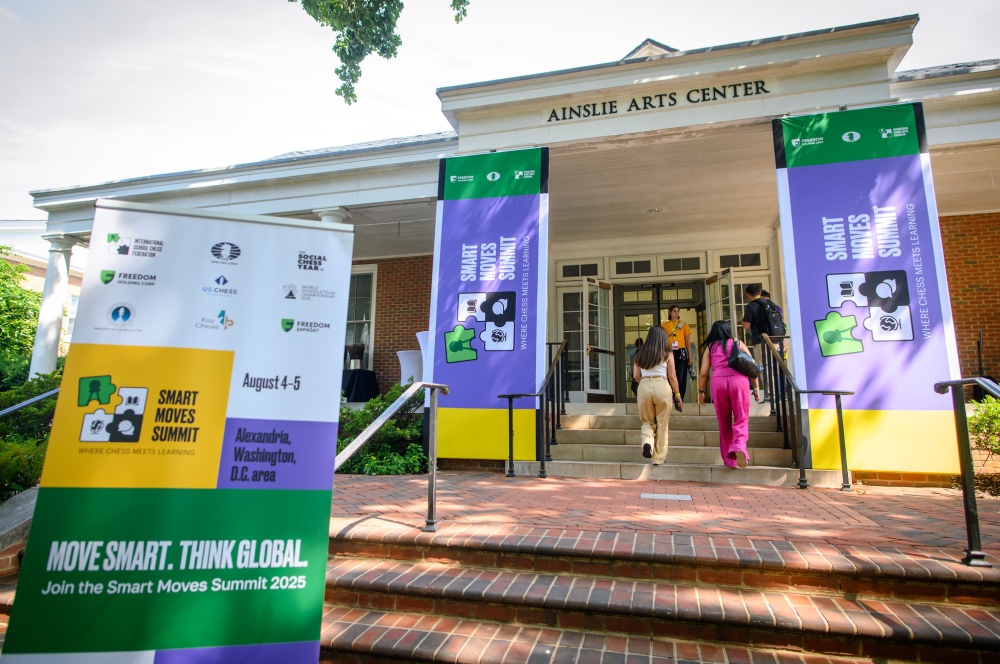
The conference will continue on Tuesday, August 5.
The full programme can be found here:
worldschoolteam2025.fide.com/events-schedule/
Photos: Michal Walusza

